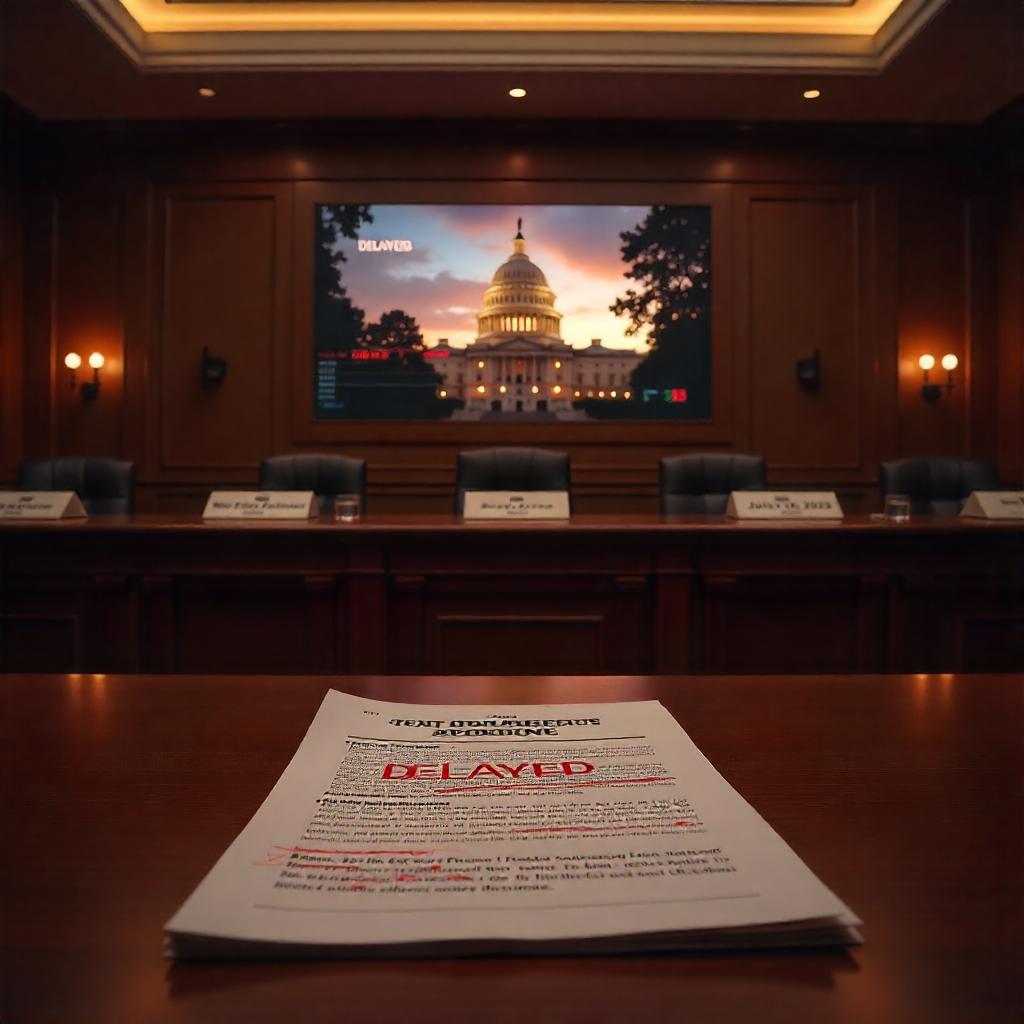Imagine waking up on July 7th, 2025, expecting the U.S. House Ways and Means Committee to shed light on one of the most pressing issues in crypto today—taxation. Instead, it hits pause. A key hearing meant to shape how Americans report gains and losses on assets like Bitcoin has been postponed due to the House being in recess. For crypto investors, businesses, and tax professionals, this isn’t just a scheduling hiccup—it’s a delay in clarity that could ripple across portfolios and balance sheets.
This hearing, originally expected during “Crypto Week” alongside other major regulatory moves, was set to tackle the uncertainties surrounding digital asset taxation. Lawmakers were preparing to define a framework that aligns everyday crypto activity with tax policy. The agenda included debates on a possible threshold for taxable transactions, whether staking gains should be taxed twice, and how to treat rewards from mining and airdrops.
But with the session postponed and no rescheduled date yet announced, questions loom large. How long will taxpayers wait for definitive guidance? Will heightened uncertainty freeze investments and slow institutional adoption? This delay may stretch beyond weeks—stretching into a broader regulatory gap at a critical juncture for the sector.
The postponement matters deeply because it puts off solutions to real-world challenges. Retail crypto users lack clarity on reporting requirements. Businesses and exchanges, still tying up complex compliance knots around Form 1099-DA and other reporting mandates, find themselves in limbo. And policymakers, pushing for America to become a global hub for crypto innovation, are stalling in turning that goal into actionable policy.
In this article, we’ll explore the full story. We’ll break down why the hearing was delayed, what it was set to achieve, and the potential consequences of postponing that critical step. We’ll also look ahead to what comes next, and how industry stakeholders should prepare. Let’s begin by walking through the hearing’s background and importance.
Background on the Hearing
In mid-July 2025, the U.S. House Ways and Means Committee signaled a pivotal shift in crypto oversight by scheduling a high‑profile hearing titled “Making America the Crypto Capital of the World: Ensuring Digital Asset Policy Built for the 21st Century.” Originally set for July 16, this session was aimed at crafting a structured tax regime for digital assets—an arena long plagued by confusion and inconsistency.
The hearing fell under the auspices of the Ways and Means Oversight Subcommittee and was part of a broader “Crypto Week.” During this period, Congress planned simultaneous discussions on stablecoin regulation, the Digital Asset Market CLARITY Act, and central bank digital currency (CBDC) concerns. Crypto Week was designed to serve as a policy reset—a concentrated effort to propel the U.S. toward becoming a global leader in digital finance.
Chairman Jason Smith expressed bipartisan ambition, stating that the July 16 hearing would focus on “affirmative steps needed to place a tax policy framework on digital assets.” The headline issues included defining taxable events, eliminating double‑taxation on staking and mining gains, and clarifying thresholds for micro‑transactions and airdrops.
This hearing quickly became a focal point for resolving long-standing friction between innovation and regulation. Daily crypto users, businesses, and exchanges have operated in a gray area for years—unsure whether to report staking rewards upon receipt or upon sale, uncertain how small transactions should be treated, and lacking uniform guidance on reporting obligations like Form 1099-DA.
More than symbolic, the hearing represented a potential turning point in U.S. tax policy. Stakeholders expected lawmakers to highlight proposed bills such as Senator Cynthia Lummis’s threshold and double-taxation relief framework, possibly mirroring in the House conversation.
By framing the hearing as a stepping-stone toward structured policy, Congress aimed to tackle a key barrier to mainstream crypto adoption: tax uncertainty. With clarity on the horizon, everyday investors, software vendors, and financial institutions could begin operating within clear, consistent rules—mitigating compliance risk and encouraging broader participation.
Reasons for the Postponement
Let’s peel back why a highly anticipated hearing got shelved at the last moment. It wasn’t headline-grabbing drama—it was Congress itself stepping back for summer.
The U.S. House adjourned for a scheduled recess the first week of July, effectively blocking any committee business, including the tax policy hearing set for that week. Crypto reporter Eleanor Terrett confirmed that the Ways & Means Oversight Subcommittee’s session was delayed due to the House being on break, and that lawmakers haven’t yet picked a new date.
This recess wasn’t unexpected. Congressional calendars routinely designate mid-year breaks after major fiscal deadlines—think budget approvals and appropriations. This summer recess, coming immediately after passing the federal budget and energy bills, means lawmakers aren’t even in D.C., let alone ready to hold panels.
But beneath the schedule lies a deeper concern. Crypto Week—originally July 14–18—was built around momentum, with hopes of pushing through tax, stablecoin, CBDC, and market structure legislation in one go. The tax hearing was poised at the heart of that legislative push. Missing that slot not only means no hearing, it risks breaking the flow of momentum that industry advocates and regulators have spent months building.
In short, two factors collided to stall progress. First, a hard stop from Congress’s summer schedule. Second, lost momentum around a larger crypto legislative window that may not align with the next available session. As a result, the hearing on digital asset taxation has now slipped into households’ “to‑do” pile—without a firm reschedule in sight.
Implications of the Delay
The ripple effects of postponing this hearing extend far beyond a shift in the congressional schedule. First, the delay now threatens the synchronized cadence of “Crypto Week”—the strategic cluster of hearings aimed at advancing U.S. crypto policy. With one cornerstone missing, momentum around simultaneous discussions on stablecoins, CBDCs, and market structure could falter, leading to fragmented policy development rather than cohesive reform.
Second, the timeline for establishing clear tax policies on digital assets now stretches indefinitely. Professionals argue this could prolong investor uncertainty, as noted in journalism from AInvest: markets may now await longer for a well-defined regulatory roadmap covering capital gains, staking, mining, and airdrops. Institutions like exchanges and tax software providers rely on legislative signals to build compliant infrastructure—without hearing transcripts or outcomes, they’re working in a fog.
Third, the ripple effects hit everyday users. Over 100 million Americans held crypto in 2024. Without clarity on what constitutes taxable events—such as $300 tracking thresholds or staking rewards treatment—many are left unsure when to report activity or risk IRS scrutiny. The soon-to-be-introduced Senate bill from Senator Cynthia Lummis, which proposes a $300 exclusion and relief from double taxation, might be hindered if the House doesn’t move on companion legislation.
Finally, the delay casts doubt on congressional priorities. Crypto groups view it as a lack of urgency from elected officials. AInvest reported that lawmakers may be prioritizing other agendas, highlighting the challenge in reaching consensus on tax reform during recess and the resulting policy lag.
In summary, the hearing’s delay creates regulatory drift. It disrupts strategic momentum, lengthens industry-wide uncertainty, complicates taxpayer decision-making, and undermines investor confidence—all while reducing the perceived priority the U.S. places on staking its leadership in global crypto policy.
Broader Context of Crypto Regulation Efforts
As the House hit pause on the tax hearing, it also inadvertently interrupted a synchronized push for sweeping crypto reforms. The week of July 14 had been designated “Crypto Week” by Republican congressional leaders, signaling a coordinated move to vote on three major bills: the CLARITY Act defining crypto market structure, the GENIUS Act governing stablecoins, and the Anti‑CBDC Surveillance State Act to prohibit a U.S. central bank digital currency.
The GENIUS Act, which the Senate passed 68–30 on June 17, 2025, mandates full‑reserve backing, disclosures, and annual audits for stablecoin issuers. It’s expected to land on the President’s desk imminently. The CLARITY Act, backed by Financial Services and Agriculture Committee votes, seeks to clarify oversight jurisdiction between the SEC and CFTC. Meanwhile, the Anti-CBDC bill would forbid a Fed-issued digital dollar, underscoring a bipartisan concern over privacy in digital transactions.
Market sentiment reflects this legislative momentum. Bitcoin has surged to new all-time highs — recently passing $118,000 — fueled in part by optimism that Crypto Week will deliver clarity and boost institutional investment. Treasury and fintech voices emphasize that a transparent regulatory framework is essential to prevent U.S. innovation from drifting offshore.
Stablecoins, in particular, are emerging as a foundational layer for payments. Circle’s USDC dominance — backed by $150 billion in U.S. Treasurys — underlines how private stablecoins are already serving as an on‑chain financial operating system. Passage of the GENIUS Act could further cement this shift, enabling mainstream businesses like Amazon or Walmart to explore stablecoin-based payments without regulatory uncertainty.
In essence, Crypto Week was meant to deliver a regulatory trifecta: defining market structure, formalizing stablecoin rules, and banning a centralized digital dollar. That package would have marked the most ambitious U.S. crypto legislation in recent memory. With the tax hearing now delayed, the cohesive narrative around Crypto Week is fraying—and the broader reform agenda risks losing its steam.
Next Steps and Future Outlook
With the crypto tax hearing postponed and no new date yet announced, the question on everyone’s mind is what happens next—and how stakeholders can best prepare. Rescheduling the hearing is essential, yet timing remains uncertain. The House Committee on Ways and Means released a notice that the hearing, originally set for July 16, will be moved due to the recess, but offered no specific target for reconvening. Given historical patterns, Congress typically returns from recess in mid‑September, suggesting the earliest plausible window for reconvening discussions.
If lawmakers prioritize rebooking before that, they could slip the hearing into a late July or August committee session. But political gridlock, unresolved appropriations, or new legislative priorities may push the date further into fall. That delay would intensify the existing regulatory ambiguity, leaving tax guidance for staking, DeFi yields, NFTs, and micro‑transactions in limbo during peak retroactive filing periods.
Parallel momentum in the Senate could influence the House’s follow-up. Senate Crypto Caucus members, such as Senator Cynthia Lummis and others, have signaled intent to introduce complementary bills. Lummis’s proposal incorporates a $300 de minimis exemption and provisions to eliminate double taxation on staking and mining. Any alignment between the Senate and House frameworks would streamline legislation—ensuring a unified policy vision rather than fragmented outcomes.
Beyond rescheduling, the industry and taxpayers should begin preparing now. Tax software developers and accounting platforms should ready for updates tied to forms such as the new 1099‑DA, recently finalized by Treasury with a $10,000 stablecoin threshold. Exchanges need to build compliance pipelines anticipating IRS standards. And individual taxpayers, particularly those involved in staking, yield farming, or frequent low-value trades, should explore angle prepping detailed transaction logs to ease future reporting friction.
Finally, stakeholders should amplify their voices. With the House at a procedural standstill, advocacy groups—including the Blockchain Association and Chamber of Digital Commerce—must maintain pressure during the interim, educating lawmakers on the importance of timely, investor-friendly tax law. Members of Congress respond to constituent calls, especially during high-visibility forks in policy.
In short, while the delay is frustrating, there’s still time to shape outcomes. Momentum could realign in early fall. Right now is the moment for informed preparation, coordinated advocacy, and creating an environment where when the hearing finally occurs, the pieces are ready to fall into place.
U.S. House Delays Crypto Tax Hearing Amid Recess: Regulatory Timeline Uncertain
The postponement of the Ways and Means crypto tax hearing isn’t just a scheduling inconvenience—it represents a temporary halt to a broader regulatory wave that briefly united bipartisan momentum under the banner of “Crypto Week.” This delay compounds existing uncertainty around taxable events tied to staking, mining, DeFi earnings, and micro-transactions—areas where millions of Americans and businesses currently navigate without clear guidance.
Yet, amidst the ambiguity lies opportunity. Fall’s congressional calendar—potentially from mid-September—offers a renewed chance to reconvene and deliver long-awaited clarity. With the Senate’s parallel legislative work (including the proposed $300 de minimis exemption and anti–double taxation measures tied to crypto rewards) steadily progressing, a harmonized House–Senate framework could swiftly emerge once hearings resume.
Now is the time for strategic response. Tech firms, exchanges, tax software platforms, and individuals alike should prepare transaction data, build compliance infrastructure, and rehearse integration of Form 1099-DA updates (including the $10,000 reporting threshold for stablecoin transfers). Public advocacy will also be critical—the window between now and the next session is when industry voices can reinforce urgency and shape the outcome.
Ultimately, delay may slow the path, but not derail it. When the hearing reconvenes, Congress will have the chance to align multiple pressing reforms—stabilizing tax policy, advancing market clarity, and anchoring U.S. leadership in crypto. For all stakeholders facing the fog of today, the roadmap becomes clearer: prepare meticulously, engage persistently, and stay informed as the next chapter unfolds.





